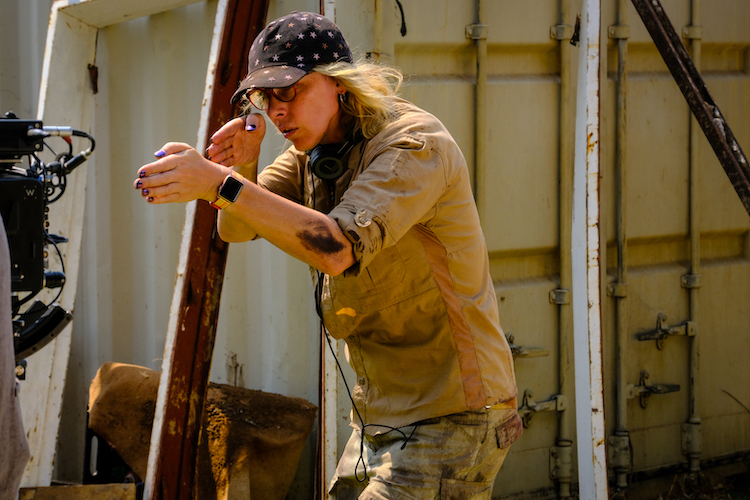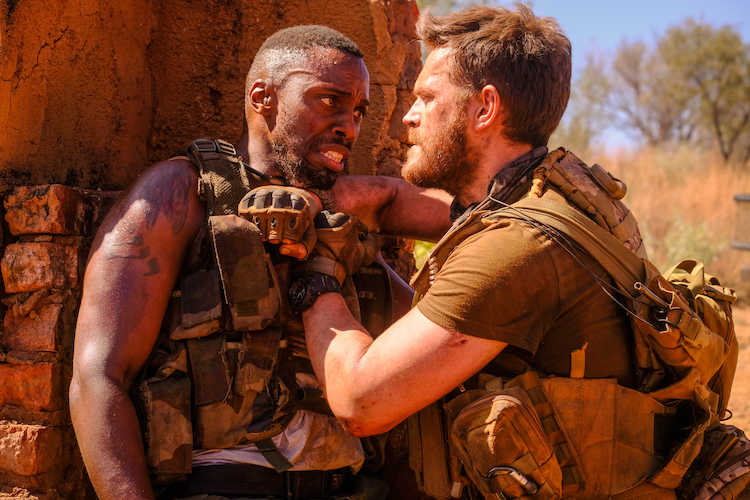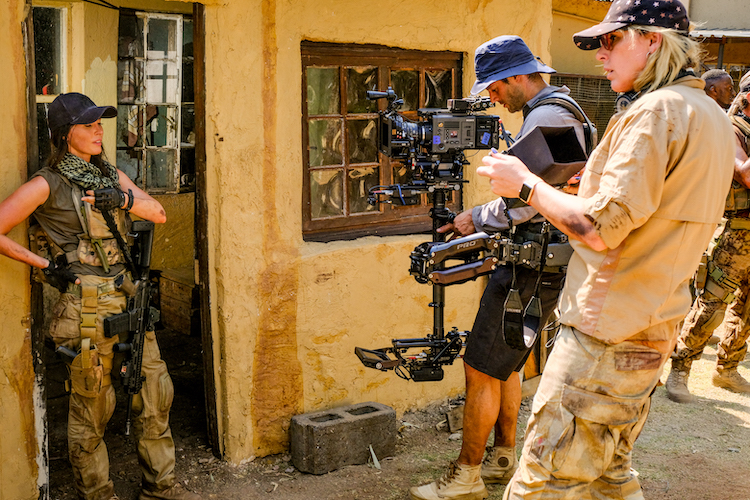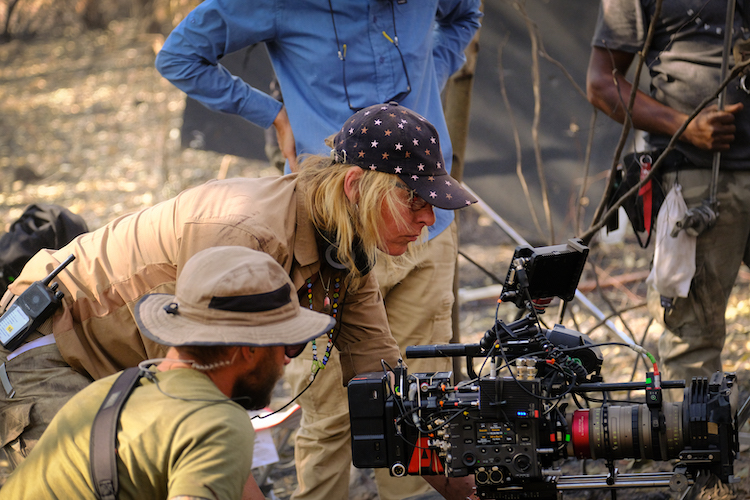Hey y’all, Barbarella here. I’m coming at you from Texas after having had a conversation with director M.J. Bassett (SOLOMON KANE, STRIKE BACK), who's about to embark on another adventure. The fruits of her last adventure, ROGUE, just became available on Blu-Ray and DVD September 1. I spoke with the seasoned, independent filmmaker about her conservation efforts and, of course, the movie.

How did you learn about lion farms, and why did you want to tell this particular story?
“I’ve been involved in conservation my whole life. Originally, I wanted to be a wildlife vet when I was a little kid. I was a vet’s assistant as a teenager, and I ran wildlife hospitals. I started making wildlife documentaries, and then I was on TV in the UK hosting natural history programs, so that’s part of my DNA to be following conservation and being interested in that world. The lion farming thing came about...I’ve been shooting in South Africa. I’ve made movies down there and a bunch of TV shows, and I love South Africa; it’s one of my favorite places in the world, and I heard that they were beginning to poison wild lion prides to take their bodies for the Eastern medicine market. Then, they started breeding lions in captivity, and it was like this horrific thing that I was hearing about.
“I came across the lion farming thing, and then when the idea of making an action movie that had an environmental theme came to the forefront, I thought, "Well, I don’t want to do the obvious rhino-poaching thing." I thought a lion’s great, then I can make the story be a kind of a fun genre, action-adventure, horror movie, but have this underlying theme and narrative. If people want to investigate and learn about it, it’s there for them. I don’t want to win an Oscar with this movie. I just want people to enjoy themselves, and then perhaps have an understanding that they didn’t have before.”
Do you have other causes you champion for which you might one day make a movie?
“Obviously, any of the environmental issues. I’m gonna do something, a proper anti-poaching movie in terms of just following the trade of the international poaching market, because it just folds itself in with gun-running, human trafficking, and drug dealing, so there’s kind of that world to explore in a thriller capacity. There’s something on pollution of the oceans, as well, what we’re doing to them. It’s really about finding a small concept that allows us to explore something big, because if you just take on what we’re doing to the planet, there’s no way of getting your head around it. I don’t want to do one about the destruction of the rainforests. It’s the biggest story. I’ve got to find a small thing to focus on, and again, because I’m a genre filmmaker, I want to wrap it into that. Yeah, there are so many causes but the environmental causes are the ones that are closest to my heart.”
Would you talk a little bit about the decision to shoot in sequence? How did that come about, and what kinds of challenges did that create for you?
“I got to shoot the film in sequence largely because as a producer of the movie, as well as the director and writer, I had enough clout on the set to be able to say, “This is how I’d like to do it.” Also, because the nature of the film – it only takes place in a few locations that were well within distance of each other – it made sense. Probably for the only time in my career, we literally started on day one and worked our way through.
“The challenges of doing it that way are day one started with an intense action sequence, so there was no kind of letting us ease ourselves into it. It was like, Okay, bang! Hit the ground running. We’re rescuing the hostages. We’re running and gunning. We’re jumping into jeeps. We’re fighting on top of a cliff. We’re jumping in a river. We get swept down the river. All those days are one after the other after the other after the other, so the cast oddly enough came in really fresh and then got beaten up through the process of the movie, which was really good because they needed to get exhausted. The very sad thing about doing it that way is that when you have a movie where the characters are dying one by one, you end up with nobody on the set towards the end of the movie. People that you loved having around, they’re like, “We’re done, packing our bags, going on home.” It’s like, “No, stay and hang out.” It’s like, “Nope, we’re going.” It’s the best possible way of doing it, but it’s super rare, so I think the challenge is never being able to do it again.”
Would you talk a little bit about casting, particularly how Megan Fox and Sisanda Henna (who needs to be in way more movies) got involved in the project?
“For sure. Megan, she’s a great catch for the movie. I never expected the film to be big enough to have her involvement. We wrote it as a very small budget picture, just basically to allow me to tell the story I wanted. I was mostly just calling up my friends and colleagues from previous productions, saying, “Hey, what are you doing? Do you want to come and play?” Philip Winchester, who plays the male lead Joey, is amazing. He’s a really good friend of mine. I’ve worked with him for years, and I basically said, “Hey, come to Africa again, and let’s just get dirty.” Same with Branden Auret, Greg Kriek, and Jessica Sutton, who plays one of the kidnapped girls.
"Sisanda, I didn’t know. Sisanda was just an audition process in Cape Town. He came in, and he was just phenomenal. That man is a good actor. He’s gonna break out big. His nuance, his story is actually the best human story in the piece, and he delivers some really heartfelt things. He’s a very well-known actor in South Africa. For me, I hope this introduces him to a larger audience because he’s absolutely phenomenal.

"Megan, when we finally finished the script, and it turned out really pretty well, everyone was saying let’s try to get a big-name female lead, and I said, “That’s not gonna work. We’re not gonna get anybody. We don’t have any money. We don’t have any time.” But, Megan got the script, she liked it, which I was astonished at because I didn’t think her character, the character that I knew her to be from her work, would be right. But, I sat down and met her, and like anybody else you meet in real life, not in the media, you go, “Oh she’s a very thoughtful, intelligent young woman.” She understands how she is perceived and wants to try to do something about that, to move the needle on who she is thought to be. Even I grew up with her in TRANSFORMERS wearing those horrible, tiny short shorts she was made to wear. She’s a beautiful woman, and she doesn’t need to be treated like a sex object to be attractive. I think she looks amazing in combat gear covered in shit because that’s a sexy, powerful woman to me. Allowing her to get into that space, and then training her up to do some weapons work, and having her lead this group of tough dudes and to stand her ground with them – I’m really pleased she joined the movie because it helps the movie, but I really hope that it helps her become another kind of actress and be perceived as somebody who can do that kind of thing.”
Would you talk a little bit about the experience filming this in South Africa, and what you love about the local crews there?
I’ve shot in South Africa a lot. I used to do a show called STRIKE BACK, which was a big action TV show for HBO/Cinemax, and that was just wall-to-wall action sequences, and we started shooting that in South Africa, which is kind of where I fell in love with the country and the teams, the crews down there, as well. Obviously, as a wildlife natural history fan, getting to South Africa was an extraordinary experience, just to shoot in that environment. But the teams, the film teams out there, are amazing. They do something that’s rough and ready that needs full commitment, physical work, tough conditions, being relentless, creative, and working at a [fast] pace. The South Africa teams are incredible. I mean, I’ve worked all over the world now, and there’s lots of places I’d love to go, but my first call is always South Africa, if I can. [When] shooting ROGUE, we shot about forty miles outside Johannesburg in the “Cradle of Humanity,” it’s called, These arid hillsides, they’re lightning conductors. They’re ferric hillsides; it means they’ve got iron in the hills. Every night the lightning storms would come down around us, and we’d have to take shelter for a while. Extraordinary to watch. But, being there with those guys and girls, it’s their country, they’re tough. They are great people. They’ve got a good sense of humor. They treat me wonderfully, and they know I love being there, so it’s a win-win for me.”

You wrote this with your daughter. How old is she, and would you talk a little bit about how that process worked?
"Isabel was twenty, twenty-one when we wrote this together. She’s my youngest daughter; I’ve got three kids. She’s just an incredibly good writer, but she never really wanted to be in the film business. One day she wrote a screen play. She said, “I’ve written this. What do you think?” It was extraordinarily good, not a genre thing. She doesn’t like genre very much. She writes dark, intense, sort of feminist-driven work, thrillers a lot, she likes those. But when I was putting ROGUE together, I didn’t have time to write the script, so I wrote an outline, a treatment for the whole thing. I knew what movie I wanted to make, and I went to Izzy and said, “Listen honey, I want to get a first draft just to see how this works. I know you’re not doing anything at the moment. Would you like to collaborate with me?” She did do the first draft, which is terrific. The movie existed, which was amazing to see. I took it away, and I did my revisions on it. She beat me up for the revisions I made that she disagreed with, and then the process kind of just back-and-forth, some dialogue here, some character work there. We treat each other with respect, and the parent-child dynamic gets put to one side a bit. She knows that I know my way around an action sequence and the structure of it so that was always very, very strong, so it was about finding the character stories and the voices in there. She’s in the movie, as well, because I couldn’t really afford any other actors. I said, “Come on, Izzy, just be in this, for goodness sake.” I made a movie called Solomon Kane about 10 years ago, and she plays a little evil witch, and she was terrific. She’s comfortable on a film set, and I didn’t have to pay her twice.”
If you were out there with those characters, not the actors, but the characters they played, and you were in a position to save two of them from being attacked and mauled by lions, whom would you save and why?
(laughing) "That’s an outrageous question! I’d save the girls. I’d save the hostages because that’s what we’ve been sent to do, and I think the other characters are probably tough enough to look after themselves."
You had mentioned that this was the most challenging shoot for you. What was challenging about it?
"I wouldn’t say it’s the most challenging in terms of what I had to do, because this sort of stuff is my bread and butter. I love making movies like this. The challenge came from we only had twenty-two days to shoot the whole thing and a very, very small budget. The challenge was a production challenge of how you make a film like this when it’s basically got a twenty-five-minute action sequence that opens the whole thing. That first action sequence was done in six days. That’s it, then everything else was night. The challenge is two weeks of nights, doing that kind of thing, knowing you’re losing time every night because the thunderstorms are coming in and torrential rain is coming down, then it gets incredibly hot. Seriously, it’s a physical challenge, but I’ve done tougher things.
“My first movie was this thing called DEATHWATCH about twenty years ago with Andy Serkis, Jamie Bell, and Matthew Rhys. That was a horror movie set in the trenches of World War I, and that was shot in the middle of the Eastern European winter. It was so cold. It was raining on the set everyday, and it would freeze on the actors, so they would be breaking ice off their costumes. I think that’s probably the toughest thing I’ve ever done, and it was my first movie so it’s all been gravy for me since then.”

Every job is an opportunity to learn. What did you learn from doing ROGUE?
"What did I learn from ROGUE? You know what is interesting? I don’t know if you know, I’m transgender. I came out a couple of years ago. One of the things I’m learning is I’m learning to be myself on a set. I know that sounds a little bit cheesy, but for the longest time I was not fully giving myself in an emotional way. I could always do the physical stuff. I could always do the kinetic stuff. I could blow things up and do car chases and gun fights. What I’m learning, and this is a process for me now, is to be a more open and available human being on a set for my cast. I love what I do, and I’m enjoying myself more than I’ve ever enjoyed myself. That’s kind of what I’m learning. The nuts and bolts of how you make the movie, everything is another experience, like I know how to do a car chase more efficiently. I know how to do [other things] more efficiently. I know where my difficulties are going to be, but now it’s sort of an emotional thing for me and, hopefully, helping me be a slightly better person.”
ROGUE, the movie over which M.J. Bassett feels she had the most creative control, is available now.
